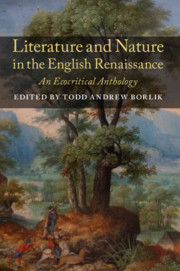Book contents
- Frontmatter
- Contents
- List of Illustrations
- Acknowledgements
- Editorial Principles: Towards the Ecocritical Editing of Renaissance Texts
- Introduction
- PART I Cosmologies
- PART II The Tangled Chain
- PART III Time and Place
- Seasons
- Country Houses
- Gardens
- Pastoral: Pastures, Meadows, Plains, Downs
- Georgic: Fields, Farms
- Forests, Woods, Parks
- Heaths, Moors
- Mountains, Hills, Vales
- Lakes, Rivers, Oceans
- PART IV Interactions
- PART V Environmental Problems in Early Modern England
- PART VI Disaster and Resilience in the Little Ice Age
- Appendix A Industrialization and Environmental Legislation in the Early Anthropocene: A Timeline
- Appendix B Further Reading: A Bibliography of Environmental Scholarship on the English Renaissance
Georgic: Fields, Farms
from PART III - Time and Place
Published online by Cambridge University Press: 05 June 2019
- Frontmatter
- Contents
- List of Illustrations
- Acknowledgements
- Editorial Principles: Towards the Ecocritical Editing of Renaissance Texts
- Introduction
- PART I Cosmologies
- PART II The Tangled Chain
- PART III Time and Place
- Seasons
- Country Houses
- Gardens
- Pastoral: Pastures, Meadows, Plains, Downs
- Georgic: Fields, Farms
- Forests, Woods, Parks
- Heaths, Moors
- Mountains, Hills, Vales
- Lakes, Rivers, Oceans
- PART IV Interactions
- PART V Environmental Problems in Early Modern England
- PART VI Disaster and Resilience in the Little Ice Age
- Appendix A Industrialization and Environmental Legislation in the Early Anthropocene: A Timeline
- Appendix B Further Reading: A Bibliography of Environmental Scholarship on the English Renaissance
Summary
In the early sixteenth century, most Tudor gentlemen would have scoffed at farmwork as drudgery. That such attitudes changed is due in no small part to the rediscovery of this text by the Roman poet Virgil, who knew first-hand the joys and frustrations of farming. His husbandry manual in verse was so influential that the term georgic became shorthand for all writing about agriculture. In contrast to pastoral, which adopts the contemplative perspective of the leisure-loving shepherd, georgic celebrates the farmer's more aggressive intervention in the natural world. Rather than bemoan the loss of the Golden Age as Ovid does, Virgil celebrates labour as a cure for idleness (which would have appealed to the Puritan work ethic of many English readers) and perhaps also urban overpopulation, which was worrying Emperor Augustus and had become a glaring problem in Stuart London. English translations of Virgil by Abraham Fleming in 1589 and this one by Thomas May, a friend of Ben Jonson's, contributed to the growing mania for agricultural “improvement.” The ecocritical merit of the georgic mode is ambiguous, as it could encourage more efficient farming methods (manuring, fallowing, tree care, and rotating crops), but also enclosing commons or putting more meadows, woodlands, and heath under the plough to boost profits (see McRae 1990).
Source: Virgil's Georgics, trans. Thomas May (1628), 3–5, 7–9.
When first the spring dissolves the mountain snow,
When th'earth grows soft again and west winds blow,
Then let your Oxen toil in furrows deep,
Let use from rusting your bright ploughshares keep.
Those crops which twice have felt the sun and twice
The cold will Ploughmen's greediest wish suffice.
Harvests from thence the crowded barns will fill.
But lest the fields we ignorantly till
To know how different lands and climates are,
All winds and seasons, let it be our care,
What every Region can or cannot bear:
Here corn thrives best; vines best do prosper there;
Some Lands are best for fruit, for pasture some …
These several virtues on each land and clime
Nature bestowed, even from the point of time
When stones in th'emptied world Deucalion° threw,
From whence th'hard-hearted race of mankind grew.
- Type
- Chapter
- Information
- Literature and Nature in the English RenaissanceAn Ecocritical Anthology, pp. 258 - 264Publisher: Cambridge University PressPrint publication year: 2019



